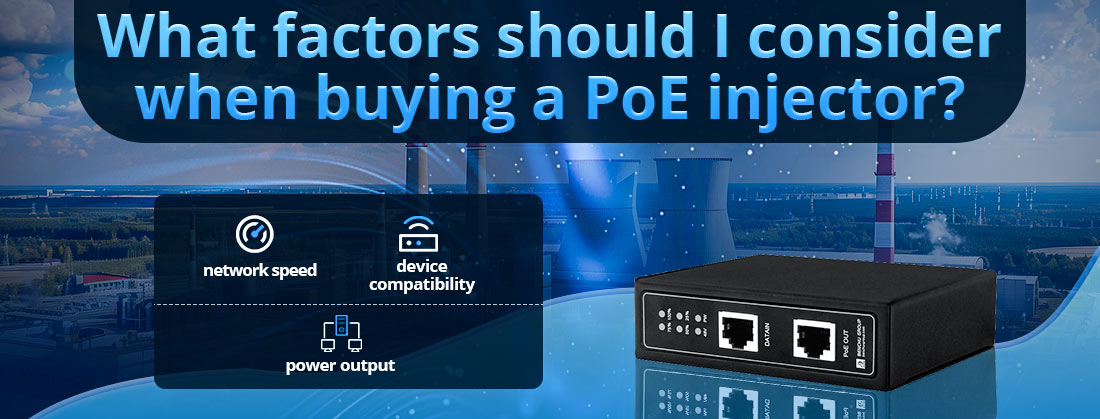
Ao selecionar um injetor de energia sobre Ethernet (POE), vários fatores -chave determinam sua compatibilidade, eficiência e desempenho para sua configuração de rede. Abaixo estão as considerações mais importantes:
1. Compatibilidade padrão POE
Injetores de Poe deve suportar o padrão IEEE 802.3 correto com base nos requisitos de energia do dispositivo conectado.
--- 802.3AF (POE)-15,4W máximo por porta
Adequado para telefones IP, câmeras básicas de segurança e pontos de acesso.
--- 802.3AT (POE+)-30W máximo por porta
Necessário para câmeras IP avançadas, pontos de acesso Wi-Fi 6 e sistemas de videoconferência.
--- 802.3BT (POE ++)-60W ou 90W por porta
--- Necessário para câmeras PTZ, iluminação LED e pontos de acesso de alta potência.
Dica: sempre verifique a classificação de energia do injetor POE nas necessidades de energia do seu dispositivo.
2. Saída de energia e orçamento
Cada injetor POE possui uma potência máxima por porta e um orçamento total de energia que determina quantos dispositivos ele pode suportar.
Saída de energia por port:
--- Se um dispositivo exigir 25W, um injetor 802.3AF (15,4w) não funcionará-escolha PoE+ (30W).
Orçamento total de energia:
--- Se conectar vários dispositivos, verifique se o injetor pode fornecer a energia total necessária em todas as portas.
Dica: obtenha um injetor com capacidade de potência um pouco mais alta do que o seu dispositivo de estabilidade.
3. Velocidade da rede (compatibilidade com Ethernet)
Os injetores de POE suportam diferentes velocidades da Ethernet. Combine a velocidade com sua rede para evitar gargalos.
| Tipo de injetor | Velocidade suportada | Melhor para |
| Ethernet rápido (10/100 Mbps) | Dispositivos POE básicos, como telefones IP e câmeras de segurança mais antigas | |
| Gigabit Ethernet (10/100/1000 Mbps) | Pontos de acesso mais modernos, telefones VoIP e câmeras IP | |
| 2.5g/5g/10g Ethernet | Aplicações de alta largura de banda como Wi-Fi 6/6e, vigilância 4K e redes de alto desempenho |
Dica: Gigabit Ethernet (1 Gbps) é a escolha padrão para a maioria dos usuários. Se estiver usando câmeras Wi-Fi 6 ou de alta largura de banda, considere os injetores de 2,5g ou 10g POE.
4. Número de portas
Os injetores de POE normalmente vêm em opções de porta única ou de várias portas.
Injetor de Poe de porta única:
--- Melhor para ligar um único dispositivo como uma câmera IP ou ponto de acesso.
Injetor de PoE de várias portas (2, 4, 8, 12 portas, etc.):
--- Ideal para pequenos escritórios, sistemas de segurança ou configurações de IoT, onde vários dispositivos precisam de energia POE.
Dica: se você precisar de vários dispositivos movidos a POE, considere uma chave POE em vez de vários injetores para obter melhor escalabilidade.
5. Tipo de entrada de energia (AC vs. DC)
Verifique como o injetor POE recebe energia:
Injetores movidos a CA:
--- Conecte-se diretamente a uma tomada de parede. Comum para configurações de casa e escritório.
Injetores movidos a DC:
--- usado em configurações industriais ou de transporte, onde está disponível a energia de 12V ou 24V DC.
Dica: escolha um injetor de AC, a menos que sua configuração exija entrada CC para aplicativos especializados.
6. Poe Injector vs. Poe Switch
Antes de comprar um injetor de Poe, considere se um Switch POE seria uma opção melhor.
Use um injetor POE se:
--- Você só precisa alimentar um ou dois dispositivos.
--- Você já tem um interruptor não-POE e não deseja substituí-lo.
Use um Switch POE se:
--- você precisa alimentar vários dispositivos POE (por exemplo, um sistema de câmera de segurança).
--- Você deseja gerenciamento de energia centralizado para melhor eficiência.
Dica: Se a escalabilidade é uma preocupação, um interruptor POE é mais à prova de futuro do que vários injetores.
7. Recursos de qualidade e proteção de construção
Os injetores confiáveis de POE devem incluir mecanismos de segurança para proteger seus dispositivos. Procurar:
--- Proteção de surto-impede os danos causados por picos de energia.
--- Proteção de sobrecarga-desliga a energia se um dispositivo desenhar muita corrente.
--- Proteção de curto-circuito-evita o superaquecimento ou dano elétrico.
--- Propertação do tempo (com classificação IP)-necessária para os injetores de POE ao ar livre em ambientes severos.
Dica: os injetores de POE de nível industrial oferecem melhor resistência ao calor e durabilidade para uso externo ou de fábrica.
8. Preço e reputação da marca
Os injetores de POE variam de preço com base na potência, velocidade da rede e recursos adicionais.
| Padrão de poe | Faixa de preço típica |
| 802.3af (15,4w) | $ 15 - $ 30 |
| 802.3AT (30W) | $ 25 - $ 50 |
| 802.3bt (60W - 90W) | $ 50 - $ 100+ |
| Injetores de PoE de várias portas | $ 100 - $ 200+ |
--- Evite marcas genéricas que podem não ter proteção contra surtos ou controle de qualidade.
Dica: o preço da correspondência com a confiabilidade - não comprometa os recursos de segurança para economizar alguns dólares.
Lista de verificação final de compra
--- Verifique o padrão POE (802.3AF, 802.3AT, 802.3BT).
--- Verifique se a saída de energia corresponde às necessidades do dispositivo.
--- Verifique a velocidade da rede (Fast/Gigabit/10G Ethernet).
--- Escolha um único ou múltiplo com base na sua configuração.
--- Verifique o tipo de entrada de energia (AC ou CC).
--- Considere uma chave POE se conectar vários dispositivos.
--- Procure recursos de segurança (surto, sobrecarga, proteção de curto-circuito).
--- Compre de uma marca confiável com boas críticas.
Conclusão
A escolha do injetor do POE certo garante a entrega confiável de energia, mantendo o desempenho da rede e a segurança do dispositivo. Considere o padrão POE, a potência, a velocidade da rede e a compatibilidade do dispositivo para obter o melhor injetor para suas necessidades. Se a alimentação de vários dispositivos, a atualização para um comutador POE pode ser uma solução de longo prazo mais eficiente.